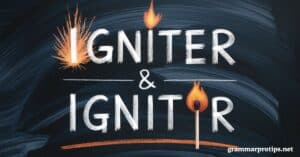When it comes to writing about professional capabilities, you’ve likely encountered the terms skill-set, skillset, and skill set. Whether you’re drafting a resume, a cover letter, or an email to a colleague, the correct usage can sometimes be unclear. While these terms refer to a collection of abilities or competencies, it can be tricky to know whether to write them as one word, two, or hyphenated.
In this article, we’ll dive deep into each variation, explore their meanings, and provide practical scenarios for each. We’ll also compare skillset vs skill set and discuss how regional differences in usage and grammar rules influence which form is most appropriate.
Let’s break it down to help you confidently choose the right term based on the context, whether you’re engaging in formal writing or using a more casual approach.
Understanding the Terms
Before we dive into specifics, let’s briefly define what we mean by these terms. A skill set or skill-set refers to the collection of abilities, expertise, or qualifications that a person has acquired to perform a specific task or job. These might include technical skills, communication skills, or even emotional intelligence.
Skill Set (Two Words)
The most traditional and widely accepted form is skill set (written as two words). This is the standard choice in many style guides like the Associated Press and Chicago Manual of Style.
It clearly communicates that you are referring to a set of individual skills or proficiencies that collectively define someone’s job skills.
Skillset (One Word)
Over time, the term skillset has emerged as a more casual or modern version of skill set. It is increasingly common in informal writing and in some business contexts, especially in places where brevity and efficiency are valued.
Skillset often conveys the idea of a well-rounded or complete set of abilities.
Skill-Set (Hyphenated)
Less common but still used, skill-set with a hyphen is sometimes seen in more formal writing or in instances where clarity is a priority. The hyphen helps tie the words together, emphasizing the cohesiveness of the collection of abilities. However, this usage is less favored by modern style guides.
Which One is Right?
The answer largely depends on the context and the formality of your writing. Below, we’ll look at examples of how each version of the term is used in different situations.
Scenario 1: Formal Email (Skill Set)
When writing a formal email to a colleague, supervisor, or client, it’s best to use the traditional skill set. This maintains clarity and adheres to professional writing standards.
Example:
Subject: Request for Skill Set Details for Upcoming Project
Dear Mr. Johnson,
I hope this message finds you well.
As we prepare for the upcoming project on corporate branding, I wanted to request a brief overview of your skill set in relation to design and digital marketing. Specifically, could you highlight your professional skills and relevant competencies that could be applied to the project?
Thank you in advance for your time.
Best regards,
Emma Green
In this context, skill set is appropriate because it’s a formal communication where clarity and professionalism are key.
Scenario 2: Casual Email (Skillset)
In more informal writing, such as a casual email to a coworker or friend, using skillset may sound more natural.
Example:
Subject: New Skills for the Team
Hey Mark,
I’ve been thinking about the kinds of job skills we’ll need for the new project, and I realized we need to build a stronger skillset in data analysis. Do you have any recommendations for tools or courses to help us level up?
Let me know your thoughts!
Cheers,
Rachel
In this example, skillset works because the tone is relaxed and friendly, and it aligns with the more modern usage of the term.
Scenario 3: Resume (Skill Set)
When listing your qualifications or abilities in a resume, it’s best to stick to the standard form skill set for clarity and professionalism.
Example:
Skills
- Project Management
- Data Analysis
- Web Development
- Skill Set: Communication, Leadership, Time Management
Using skill set in your resume conveys professionalism and is the form most recruiters will expect.
Scenario 4: Creative Writing or Informal Blog Post (Skill-Set)
In more creative writing or an informal blog, you might choose skill-set if you want to add a bit of emphasis to the collection of abilities being described.
Example:
In today’s fast-paced world, having a well-rounded skill-set is key to career advancement. From technical competencies to emotional intelligence, the more abilities you bring to the table, the better your chances at success.
In this context, the hyphenated version might be used to give the phrase an additional sense of cohesion and to make it stand out.
Key Differences: Skillset vs. Skill Set
Let’s summarize the differences:
| Term | Usage | Context |
|---|---|---|
| Skill Set | Traditional form, widely accepted by style guides | Formal writing, resumes, professional contexts |
| Skillset | Informal, modern usage | Casual emails, blog posts, business jargon |
| Skill-Set | Less common, used for clarity or emphasis | Formal writing or when emphasizing the collection of skills |
Is Skillset One Word or Two?
You may be wondering, is skillset one word or two? The answer depends on which style guide you’re following and the level of formality required.
In general:
- Skill set (two words) is considered the standard in formal writing.
- Skillset (one word) is becoming more common in informal contexts but may not always be accepted in formal settings.
Grammar Rules and Style Guides
Many style guides (e.g., Chicago Manual of Style, AP Style) recommend using skill set as two words. However, more modern guides and dictionaries are starting to accept skillset as one word, especially in the context of professional writing.
In informal writing, using skillset can make the text flow more naturally and save space. However, when aiming for the highest level of professionalism, it’s always best to use skill set.
Regional Differences in Usage
Another important point to note is that regional differences can also impact the choice between skill set and skillset. For example, British English tends to stick to the two-word form, while American English is more likely to accept skillset in informal contexts.
Examples and Best Practices for Different Writing Styles
Here’s a quick overview of when to use each version:
- Skill Set (Two Words): Best for formal writing, resumes, cover letters, or professional reports.
- Skillset (One Word): Common in informal business writing, emails, and internal communications.
- Skill-Set (Hyphenated): Use for clarification or when emphasizing the idea of a complete collection of abilities.
Conclusion
When deciding between skill-set, skillset, or skill set, the key is to consider your audience and the tone of your writing. Skill set is the safest bet for formal situations, while skillset is suitable for more casual contexts. Always remember to check the relevant style guide if you’re in doubt, and adjust based on regional differences or public perception of language.
As language evolves, so too do the ways we communicate our professional skills and competencies. By staying flexible and understanding these nuances, you’ll be able to effectively express your expertise and talent in any situation.

Sienna Mauldon is a passionate writer and grammar expert. On her blog, she shares easy-to-follow guides to help readers master grammar rules and improve their writing. With a love for language and teaching, Sienna makes grammar simple and fun for everyone, from beginners to experienced writers.








